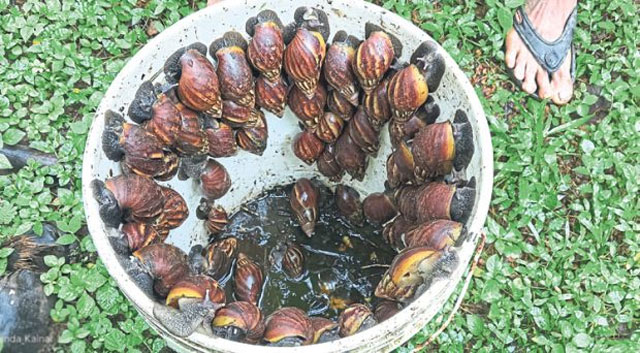Daijiworld Media Network – Sullia
Sullia, Jul 19: African giant snails have been spotted in farmlands across Sullia taluk, raising serious concerns among local farmers. Controlling this invasive species has now become a significant challenge for them.
The African giant snail, one of the largest and most destructive snail species in the world, belongs to the Gastropoda class of the Mollusca phylum. These hermaphroditic creatures originate from East African countries. They possess a conical shell and have a lifespan ranging from 2 to 12 years. Over their lifetime, they can lay up to 1,200 eggs in multiple phases and are known to feed on more than 50 plant species.

In the Panattila area of Ubaradka Mithoor village, these snails have been found in the farms of 7 to 8 farmers. During the day, the snails remain on the ground, hiding beneath plant bases and shrubs. However, by evening, they climb agricultural plants and cause extensive damage. Coconut trees, areca palms, and banana plants are particularly vulnerable to infestation.
These African giant snails are particularly attracted to decaying organic matter such as cabbage, pineapple, papaya, and rotting vegetables. Horticulture experts have advised that farmers maintain cleanliness in their farms and use baits made from these attractants to collect and destroy the snails. Additionally, their breeding grounds should be destroyed.
For severe infestations, applying super phosphate, ash, lime, or caustic soda around the base of plants can help curb their spread. Farmers are also advised to place moist gunny bags soaked in jaggery solution across the farms to attract and collect the snails for destruction.
The horticulture department and the KVK (Krishi Vigyan Kendra) Mangaluru team visited the affected farmlands in the Panattila area of Ubaradka and provided necessary guidance and information to the farmers. Notably, this species was earlier detected 4–5 years ago in the Madikeri and Beltangady regions. Officials stressed that timely action by farmers can help prevent further spread.
"Farmers can begin control measures through mechanical methods and gradually implement additional strategies to contain the infestation," said Pramod C M, senior assistant director of horticulture, Sullia.